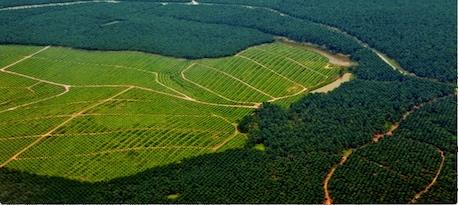
By Roger Aitken — Action taken by HSBC, one of the largest banking and financial services organisations globally with an international network comprising around 7,500 offices in over 80 countries, has resulted in thousands of hectares of primary rainforest in the heart of Papua, Indonesia, being saved following an investigation into the subsidiary of one of its own clients in the palm oil sector.
The move follows the London-based Environmental Investigation Agency (EIA) and Greenpeace writing to four banks - ABN Amro, HSBC, ING and Rabobank - all of whom helped set up a new $750m bond issued by Noble Group earlier this year in March.
It was the EIA that back in November 2013 had published a report titled ‘Banking on Extinction’ that revealed that despite adopting polices to keep it from financing deforestation, HSBC “bankrolls deforestation” and was “pushing Bornean orangutans and other endangered species to the brink.”
The body cited HSBC then as a leading financier of the palm oil industry, providing “loans worth hundreds of millions of dollars to some of its worst elements.” From this initial work, Greenpeace picked up the baton to pressure the bank further.
The Non-Governmental Organisations (NGOs) this year presented the banks with a suite of evidence showing that Noble Plantations, part of Noble Group, was preparing to clear around 18,000 hectares (ha) of primary forest for palm oil on its PT Pusaka Agro Lestari (PT PAL) concession in Papua, the largest and easternmost province of Indonesia, before an order to stop was issued.
It is one of two concessions owned by the company and covers more than 38,000ha, most of which is classed as primary forest. By 2016, Noble Plantations had cleared 6,500ha of primary forest and has been exposed in the past on numerous occasions for clearing forests and violating the rights of local and indigenous peoples.
The company has been ordered by the Roundtable on Sustainable Palm Oil (RSPO), the industry body set up in 2004 to establish clear ethical and ecological standards for producing palm oil, to stop work until the investigation is complete. Should Noble not comply, it would face sanctions from the RSPO, including possible expulsion.
It represents the first time a major bank has requested an RSPO investigation into one of its clients.
All four banks have palm oil policies that prohibit funding of companies destroying primary or High Conservation Value (HCV) forest, with HSBC producing a stronger 'no deforestation' policy in February 2017 after Greenpeace and public pressure.
Greenpeace UK’s Jamie Woolley commenting said: "After years of turning a blind eye, the financial sector is finally starting to take a tougher line on rogue palm oil companies. HSBC’s decision to do the right thing and trigger an investigation into its own client could save thousands of hectares of pristine rainforest.
He added: “If other banks are serious about stopping the destruction of rainforests for palm oil, they need follow suit and take responsibility for their clients’ behaviour.”
Audrey Versteegen from the Environmental Investigation Agency remarked: “The RSPO now has a canvas of 18,000 hectares of primary forest in Papua on which to sketch out the meaning of 'certified sustainable palm oil'. Noble’s destructive plans must be sent back to the drawing board and the assessors, upon whose flawed environmental audits these plans were based, rooted out of RSPO certification.”
As with many other companies involved in the palm oil sector, banks rely on the RSPO’s standards to reduce their exposure to destructive companies. However, countless investigations by civil society organisations have shown that the RSPO’s system is not effective.
The body’s safeguards are “routinely and widely flouted” by members according to a joint EIA/Greenpeace press statement issued on July 10, “resulting in massive deforestation and conflict with local communities.”
The NGOs are calling on other banks to take responsibility for their clients’ behaviour, and for the RSPO to overhaul its regulations, known as the Principles & Criteria, to bring them into line with the ‘no deforestation, no peat, no exploitation’ standards adopted by most major brands and commodities traders.
TriplePundit has published articles from over 1000 contributors. If you'd like to be a guest author, please get in touch!














